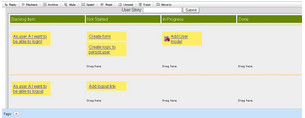 | Microsoft has worked the kinks out of Vista. To make a clean break with colossal failure, Microsoft has renamed their flagship OS Windows 7. Windows 7 hits the mark just in time to be arguably obsolete. The impact of Windows 7 will be marginalized in the coming year by Google's Chrome OS and by competing products like Jolicloud. |
I have been developing web apps since the late 1990s. I've been fond of bragging that we did ajax back when it was known as remote scripting and used an asynchronous JavaScript call back function.
 I am all about making faster, richer web apps that leave native desktop apps in the rear-view mirror. Chrome OS is an instant boot operating system optimized for a superior web experience via superior local caching and zippy JavaScript.
I am all about making faster, richer web apps that leave native desktop apps in the rear-view mirror. Chrome OS is an instant boot operating system optimized for a superior web experience via superior local caching and zippy JavaScript.When Acer and HP netbooks featuring Chrome OS hit the shelves in 2010 (HP, Acer Developing Google Chrome OS Netbooks), the death knell for file-based operating systems will begin.
File-based operating systems will give way to web-centric operating systems just like film-based photography gave way to digital imagery. Who remembers cameras with roll film?
Roll film cameras like the Brownie gained popularity because consumers love devices that are expedient and easy-to-use.
You push the button, we do the rest. ~ Kodak slogan circa 1900
 One doesn't need the experience of loading 4x5 inch sheet film into a film holder, then sliding it into the back of a view camera to understand how revolutionary roll film was to consumers in the early 20th century.
One doesn't need the experience of loading 4x5 inch sheet film into a film holder, then sliding it into the back of a view camera to understand how revolutionary roll film was to consumers in the early 20th century.Consumers dig easy to use and cheapHow many computing people ensconced in a coffee shop are not connected to the web? Yet, inexplicably, my 64-bit notebook with 8 gigs of RAM takes several minutes to boot. Adding a turtle-like virus scan to that startup time leads to significant thumb twiddling.
I have stopped being an apologist for Microsoft. Not because Microsoft doesn't make great products - I'd still rather develop in Visual Studio than Eclipse. Rather, Microsoft has squandered near monopolies in several product areas by being slow on the uptake.
Why are most of the forward-thinkers working at Google?Consumer devices whose primary function is easy access to internet services, such as the world wide web or e-mail, have been with us for a while. The term internet appliance was popularized in the late 1980s and 1990s. simPC, a web appliance for grandma and grandpa to share with grandchildren, debuted as a proof of concept in 2004 running from a solid state drive, based on the Linux OS, and requiring an internet connection.
I am going to bite the bullet to upgrade to Windows 7 on my Vista notebook. But, I'm leaving Windows XP on my development box until further notice because Microsoft, in a consumer-unfriendly decision, hasn't made an effort to ease the leapfrog (over Vista) from XP to Windows 7.
 As long as the boot time for Chrome OS, and other web-centric clones, remains almost instantaneous, the
As long as the boot time for Chrome OS, and other web-centric clones, remains almost instantaneous, the- technical hurdles, like richer & faster web apps and bigger internet pipes, and the
- psychological hurdles, like data storage on the cloud rather than locally,
We have reached a turning point where
- Price points for computers become affordable for most ($299),
- Web-centric operating systems are free,
- Software installation and virus protection becomes obsolete,
- Software is online, and
- Data storage is on some amorphous genie called the cloud.
Of Interest
- To Learn - See What We Need To Know About Chrome OS.
- To View - Watch Chrome OS Open Source Project Announcement video.
- To Join - Register on Chrome OS Forums; a new discussion forum with valuable information about Chrome OS Install and Setup Guide and How-to Run Google Chrome OS From a USB Drive.
- To Speculate- Read Jolicloud aims to steal Chrome OS's netbook thunder to see how things are heating up in the web-centric OS space.
- To Follow - VP of Product Management for Chrome OS, Sundar Pichai, on Twitter at @sundarpichai
- To Follow - Lead Engineer for Chrome OS, Matthew Papakipos, on Twitter at @mpapakipos
















